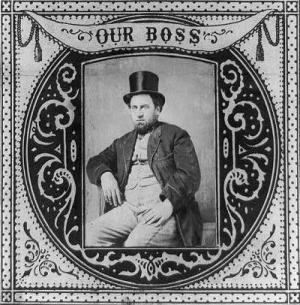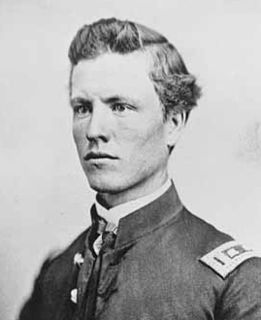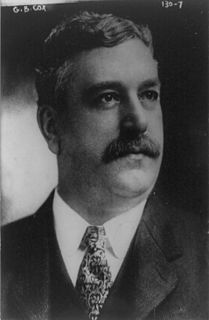 W
WIn politics, a boss is a person who controls a faction or local branch of a political party. They do not necessarily hold public office themselves; most historical bosses did not, at least during the times of their greatest influence. Numerous officeholders in that unit are subordinate to the single boss in party affairs. Bosses may base their power on the support of numerous voters, usually organized voting blocs, and manage a coalition of these blocs and various other stakeholders. When the party wins, they typically control appointments in their unit, and have a voice at the higher levels. Reformers typically allege that political bosses are corrupt. This corruption is usually tied to patronage; the exchange of jobs, lucrative contracts and other political favors for votes, campaign contributions and sometimes outright bribes.
 W
WAlbert Alonzo "Doc" Ames was a doctor and politician who held four non-consecutive terms as mayor of Minneapolis, Minnesota. His fourth term was marked by multiple prosecutions for political corruption, extortion, and racketeering in a scandal which was publicized nationwide by muckraking journalist Lincoln Steffens in a 1903 article in McClure's Magazine titled The Shame of Minneapolis. Ames was found guilty of corruption, but after a successful appeal and multiple mistrials the charges were dropped. Erik Rivenes, however, has called the downfall of Mayor Ames, "one of the greatest political scandals in Minnesota history."
 W
WThomas "Tom" Anderson (1858–1931) was a political boss and state legislator, and the unofficial “mayor” of Storyville in New Orleans, Louisiana.
 W
WJohn Moran Bailey was an American politician who played a major role in promoting the New Deal coalition of the Democratic Party and its liberal policy positions.
 W
WCharles Ray Brayton was an American politician and lobbyist. A Republican, The New York Times called him the "Blind Boss of Rhode Island," drawing parallels with New York City's disgraced political boss, William "Boss" Tweed.
 W
WWilliam Michael Bulger is an American former Democratic politician, lawyer, and educator from South Boston, Massachusetts. His eighteen-year tenure as President of the Massachusetts Senate is the longest in history. He then became president of the University of Massachusetts.
 W
WHarry Flood Byrd Sr. was an American newspaper publisher, politician, and leader of the Democratic Party in Virginia for four decades as head of a political faction that became known as the Byrd Organization. Byrd served as Virginia's governor from 1926 until 1930, then represented it as a United States Senator from 1933 until 1965. He came to lead the "conservative coalition" in the United States Senate, and opposed President Franklin D. Roosevelt, largely blocking most liberal legislation after 1937. His son Harry Jr. succeeded him as U.S. Senator, but ran as an Independent following the decline of the Byrd Organization.
 W
WThomas C. Campbell, also known as T. C. Campbell, was an American lawyer and Republican political boss.
 W
WDon Chafin was the sheriff of Logan County, West Virginia and a commander in the Battle of Blair Mountain. As sheriff of Logan County, Chafin was a fierce opponent of unionization and received hundreds of thousands of dollars from coal mine operators in return for his violent suppression of the United Mine Workers union.
 W
WGeorge Barnsedale Cox (1853–1916) was a political boss in Cincinnati, Ohio, United States, a member of the Republican Party, and associate of William Howard Taft.
 W
WEdward Hull "Boss" Crump Jr. was an American politician from Memphis, Tennessee. Representing the Democratic Party, he was the dominant force in the city's politics for most of the first half of the 20th century, during which the city had a commission form of government. He also usually dominated Tennessee politics from the 1920s to the 1940s. He was elected and served as mayor of Memphis from 1910 to 1915 and again briefly in 1940. However, he effectively appointed every mayor who was elected from 1915 to 1954.
 W
WJames Michael Curley was an American Democratic politician from Boston, Massachusetts. He served four terms as Mayor of Boston. He also served a single term as Governor of Massachusetts, characterized by one biographer as "a disaster mitigated only by moments of farce" for its free spending and corruption. He also served two terms, separated by 30 years, in the United States Congress and was a frequent candidate for other state and national offices. He was twice convicted of criminal behavior and notably served time in prison during his last term as mayor. He is remembered as one of the most colorful figures in Massachusetts politics.
 W
WRichard Joseph Daley was an American politician who served as the Mayor of Chicago from 1955 and the chairman of the Cook County Democratic Party Central Committee from 1953 until his death. He has been called "the last of the big city bosses" who controlled and mobilized American cities. Daley was Chicago's third consecutive mayor from the working-class, heavily Irish-American South Side neighborhood of Bridgeport, where he lived his entire life. He was the patriarch of the Daley family, whose members include Richard M. Daley, another former mayor of Chicago; William M. Daley, a former United States Secretary of Commerce; John P. Daley, a member of the Cook County Board of Commissioners; and Patrick Daley Thompson, an alderman of the Chicago City Council.
 W
WTom Dennison, known as Pickhandle or Old Grey Wolf, was an American political boss and racketeer in Omaha, Nebraska. A politically savvy, culturally astute gambler, Dennison was in charge of the city's wide crime rings, including prostitution, gambling and bootlegging in the 1920s. Dennison is credited with electing "Cowboy" James Dahlman mayor of Omaha eight times, and when losing an election, inciting the Omaha Race Riot of 1919 in retribution against the candidate who won.
 W
WRaymond Wallace Goodman was an American law enforcement officer and businessman who served as Sheriff of Richmond County, North Carolina from 1950 until 1994, making him the longest serving sheriff in North Carolina history.
 W
WFrank Hague was an American Democratic Party politician who served as the Mayor of Jersey City, New Jersey from 1917 to 1947, Democratic National Committeeman from New Jersey from 1922 until 1949, and Vice-Chairman of the Democratic National Committee from 1924 until 1949.
 W
WMarcus Alonzo Hanna was an American businessman and Republican politician who served as a United States Senator from Ohio as well as chairman of the Republican National Committee. A friend and political ally of President William McKinley, Hanna used his wealth and business skills to successfully manage McKinley's presidential campaigns in 1896 and 1900.
 W
WJohn Vincent Kenny was mayor of Jersey City from 1949 to 1953.
 W
WThomas Joseph Pendergast, also known as T. J. Pendergast, was an American political boss who controlled Kansas City and Jackson County, Missouri, from 1925 to 1939.
 W
WThomas Stockdale Rhea (1871–1946) was a Democratic politician from the U.S. Commonwealth of Kentucky. He served as Kentucky State Treasurer in 1912 and was state highway commissioner in the administration of Governor Ruby Laffoon. Known as "The Sage of Russellville" or "The Gray Fox", Rhea was a powerful Democratic political boss in the state. He was an unsuccessful candidate for governor in 1935, losing to A. B. "Happy" Chandler in the Democratic primary.
 W
WJohn Henry Roraback was an American lawyer, businessman, and Republican political boss in the state of Connecticut. He was one of the most influential figures in early 20th century Connecticut, and had a national impact as well.
 W
WAbraham Ruef was an American lawyer and politician. He gained notoriety as the corrupt political boss behind the administration of Mayor Eugene Schmitz of San Francisco during the period before and after the 1906 San Francisco earthquake.
 W
WJefferson Randolph "Soapy" Smith II was an American con artist and gangster in the American frontier.
 W
WJohn Henry Whallen was a Democratic Party political boss in Louisville, Kentucky during the late 19th and early 20th centuries. Born in New Orleans, he moved with his family to Cincinnati, Ohio in his youth. As a boy during the Civil War he served the Confederate Army in Schoolfield's Battery as a "powder monkey", a boy who carried gunpowder. He later served as a courier for General John Hunt Morgan.